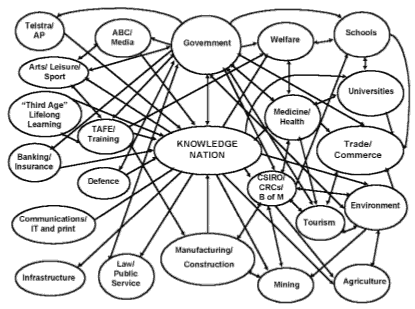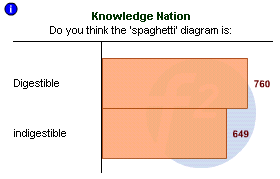
Editorial 05 July 2001
"You Get No Bread With One
Meat Ball"
Little man felt so very bad,
One meat ball is all he had.
And in his dreams he can still hear that call,
You get no bread with your one meat ball.
[last verse of Calvin Russell's classic]
Last Monday, Labor Party leader Kim Beazley together with Barry Jones unveiled the report An Agenda for the Knowledge Nation: Report of the Knowledge Nation Taskforce.
David Kemp: This is not a bowl of spaghetti and meatballs. This is a diagram that accurately represents the knots that Australia is going to be tied up in if Kim Beazley ever tries to put into effect this huge grab bag of promises and proposals that he released this morning.
John Howard: Look, my message to Mr Beazley and I think it's the message of Australians is, you know, spare us the spaghetti and meatball flowcharts.
Alan Ramsey (SMH columnist): In one mad moment, with his incomprehensible bird's nest sketch of 23 circles and 40 train lines, Barry Jones made Kim Beazley's Knowledge Nation an instant national joke. ...One look at that absurd drawing... must just about have killed Knowledge Nation as a politically salable product, at least for now.
Jones and Beazley between them have blundered, grossly, and it's hard to see, in the few months between now and polling day, how there can be any comeback for Knowledge Nation.Margo Kingston (SMH columnist): Confession of a fruit loop: I love Barry Jones's diagram. Vision ain't a word, it's a hard slog. Decisions here bounce onto consequences there, and top-drawer minds are required to visualise the goal and make it happen. When was the last time a political party produced an unashamedly intellectual document which dared to use big words and invited debate and critique before decisions on priorities and how to pay for them were made?
Kim Beazley: Barry is trying to explain the concept of the Knowledge Nation with this [flow chart] - how you coordinate knowledge to create new industries and to renovate existing industries and how you use knowledge in a coordinated way to deal with the problems of the country be it environment, be it health.
If you've not had a look at it, here it is [page 11 of the report]:

Funny thing, if you take twenty seconds (less than 1 second per
"meatball") it hardly requires rocket science to understand what is being
diagrammed. It is most unfortunate that the Prime Minister and the Minister for
Education felt obliged to resort to ridicule in reply. If nothing else the
diagram demonstrates, in part, the high degree of interdependence of the forces
that drive a 21st century economy. There are twenty-three elements
shown in the Taskforce's diagram, there could be many more. However, to carry
Dr. Kemp's analogy a bit further, if you want to use only one meatball,
Australia isn't going to get much bread on the table in a decade or two. A
balance has to be struck in rebuilding and modernising Australia. Fostering one
phase of the economy while not supporting those areas interdependent with it, is
counter productive. So, for example, with poor universities the teaching of math
and science subjects is inferior, therefore, our maths and science teaching in
primary and secondary schools will be inferior, which in turn leads to a decline
in interest and competence in maths and science. Reflect on that the New South
Wales Government has just spent $145 million to renovate and upgrade the state's
Conservatorium of Music, and the Premier has declared it to be, "The best
college of music in the world." It's not. When it is staffed with teachers who
are among the world's best, then he can command bragging rights.
Nevertheless, Mr Carr's got the priorities right. If you want
to attract the best people, give them world-class facilities. In contrast, The
Federal Government is offering fellowships (which on the world stage are of
moderate value) with which it hopes to reverse the brain drain by attracting
researchers and scholars to clapped out universities and research
establishments. When Mr Beazley comes to delineate Labor Party policy, setting
out the prioritisation and specifics of his Knowledge Nation,
we'll know better just how he intends to implement his Taskforce's guidelines.
The question of costing the Taskforce's recommendation has been
echoed repeatedly from all quarters along with
the somewhat more muted one, how
 will
the twenty complex recommendations (which contain something over 90 sub-recommendations) be prioritised? In the meantime
the majority of political commentators focus predictably on appearance rather
than substance.
Alan Ramsey declares the Knowledge Nation is now critically wounded.
If that be so, Australia will be the worse for it.
Margo
Kingston, slower to the draw, hopes those that came to ridicule will not
gain the day and closes her column, which incidentally contains a scathing
cartoon, with a serve Pat Rafter could have been proud of, "Since pygmies
in the media have chosen the path of anti-intellectualism, let's hope they
retire to snigger corner and let people who care have a read and a think and
make a contribution to a fundamental debate."
will
the twenty complex recommendations (which contain something over 90 sub-recommendations) be prioritised? In the meantime
the majority of political commentators focus predictably on appearance rather
than substance.
Alan Ramsey declares the Knowledge Nation is now critically wounded.
If that be so, Australia will be the worse for it.
Margo
Kingston, slower to the draw, hopes those that came to ridicule will not
gain the day and closes her column, which incidentally contains a scathing
cartoon, with a serve Pat Rafter could have been proud of, "Since pygmies
in the media have chosen the path of anti-intellectualism, let's hope they
retire to snigger corner and let people who care have a read and a think and
make a contribution to a fundamental debate."
Currently, the SMH online pole doesn't strongly support
Ramsey's assessment: as of 10:30 am July 5th 46.% found it
indigestible, 54% not so. Maybe we're not quite so thick as some appear
to believe, and perhaps reports of Knowledge Nation's demise through ridicule
are premature. (click
here for latest pole results).
It's interesting to note that while the form of the Taskforce's report has been derided and criticised neither its conclusions nor the data it presents to support them are persuasively contradicted. That said, the questions that arise devolve to:
are the initiatives that have been announced and costed by the Coalition Government sufficient to adequately diminish/reverse Australia's slide downward in education, research and development relative to its OECD cohort, and do we as a nation care?
how are we to judge whether or not a Labor Government is liable to be better or worse than the Coalition in improving the situation?
Certainly upon reflection the educational, scientific and technological communities are disquieted by the Coalition's response to the declining condition of our universities and publicly funded research institutions, as well as its inadequate support for research and development per se, but as yet they have nothing concrete on which to judge Labor's program. We shall have to wait, but rail as government members may, the wait may be worth it.
Alex Reisner
The Funneled Web